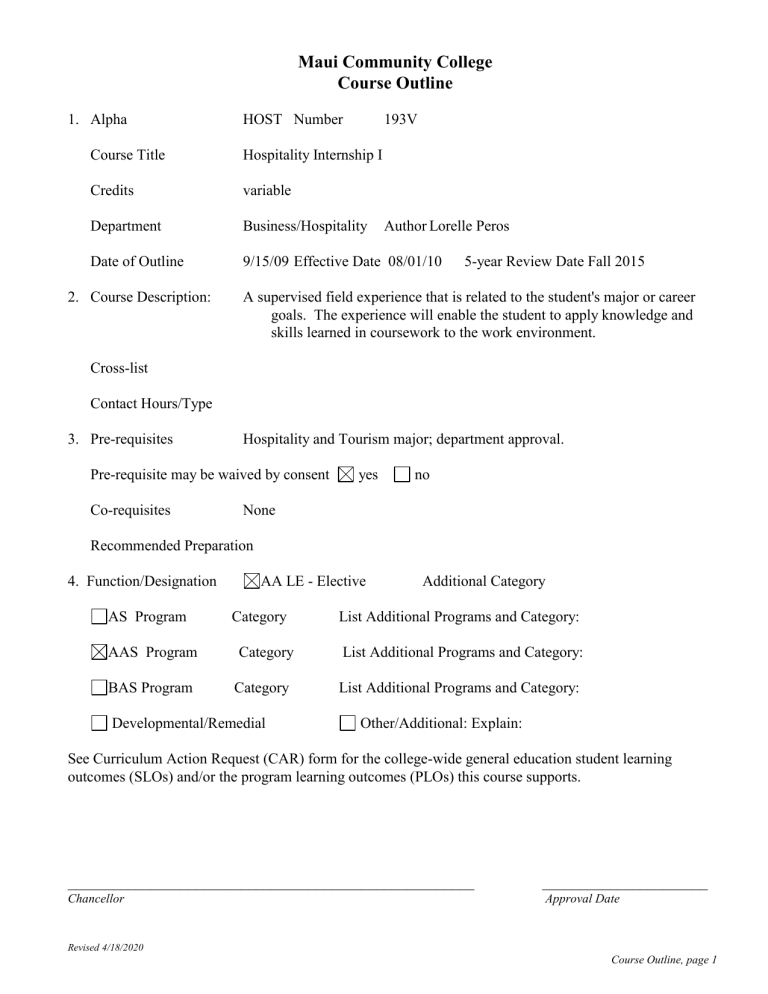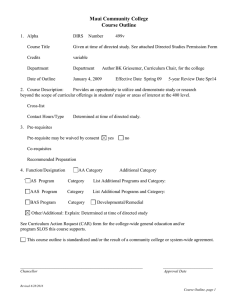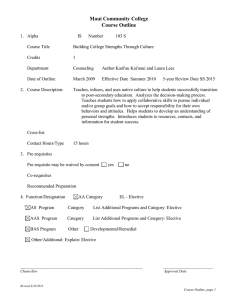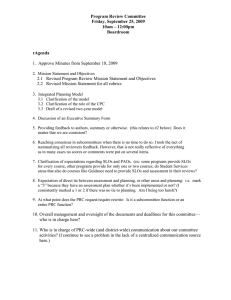2009.22 - Hospitality & Tourism (HOST) 192V: Hospitality Internship I, Course Outline

Maui Community College
Course Outline
1. Alpha
Course Title
Credits
HOST Number
Hospitality Internship I variable
193V
Department
Date of Outline
Business/Hospitality Author Lorelle Peros
9/15/09 Effective Date 08/01/10 5-year Review Date Fall 2015
2. Course Description: A supervised field experience that is related to the student's major or career goals. The experience will enable the student to apply knowledge and skills learned in coursework to the work environment.
Cross-list
Contact Hours/Type
3. Pre-requisites Hospitality and Tourism major; department approval.
Pre-requisite may be waived by consent yes no
Co-requisites None
Recommended Preparation
4. Function/Designation AA LE - Elective Additional Category
AS Program Category List Additional Programs and Category:
AAS Program Category List Additional Programs and Category:
BAS Program Category List Additional Programs and Category:
Developmental/Remedial Other/Additional: Explain:
See Curriculum Action Request (CAR) form for the college-wide general education student learning outcomes (SLOs) and/or the program learning outcomes (PLOs) this course supports.
______________________________________________________
Chancellor
Revised 4/18/2020
______________________
Approval Date
Course Outline, page 1
This course outline is standardized and/or the result of a community college or system-wide agreement.
Responsible committee: HOST Program Coordinating Council
2
5. Student Learning Outcomes (SLOs): List one to four inclusive SLOs.
For assessment, link these to #7 Recommended Course Content, and #9 Recommended Course
Requirements & Evaluation. Use roman numerals (I., II., III.) to designate SLOs
On successful completion of this course, students will be able to:
I. Apply job readiness skills to obtain an internship/co-op job placement
II. Perform duties at the worksite according to industry standards in a field relating to the student's major.
III. Apply classroom knowledge and skills in the workplace.
IV. Explore career opportunities related to the hospitality and tourism industry.
6. Competencies/Concepts/Issues/Skills
For assessment, link these to #7 Recommended Course Content, and #9 Recommended Course
Requirements & Evaluation. Use lower case letters (a., b.…zz. )to designate competencies/skills/issues
On successful completion of this course, students will be able to: a. Complete and submit a resume and cover letter to a prospective employer. b. Interview for an internship/co-op placement. c. Clarify career goals and aspirations. d. Demonstrate critical thinking and decision-making skills. e. Demonstrate team skills. f. Demonstrate reliability. g. Demonstrate appropriate workplace ethics. h. Adhere to safety standards. i. Manage time and resources. j. Accept direction with a positive attitude. k. Project willingness to learn new techniques and procedures. l. Maintain professional appearance in accordance with dress codes and grooming policies. m. Communicate thoughts clearly in verbal and written form. n. Use appropriate industry jargon and terminology. o. Demonstrate effective listening skills. p. Demonstrate positive non-verbal skills. q. Maintain positive relations with co-workers and customers. r. Understand and use relevant terminology appropriately. s. Identify duties required of a person in the Hospitality and Tourism field. t. Solve job related problems. u. Identify organizational structure of the workplace. v. Explain how their job fits into the organizational structure. w. Validate career goals and aspirations as a result of the work experience.
7. Suggested Course Content and Approximate Time Spent on Each Topic
Linked to #5. Student Learning Outcomes and # 6 Competencies/Skills/Issues
1 class session Introduction (I, II, III, IV), (a-w)
Icebreaker/get acquainted activity
Introduction to the course syllabus including a discussion of course materials,
Revised 4/18/2020 course outline
assignments, projects, and requirements
1 - 2 weeks Internship/Job placement process (I, IV), (a, b, c, k, m, o, p, s)
General job serach
Resume
1 - 2 weeks Career goal-setting (I, IV), (a, b, c, s)
The Interview Process
1 - 2 weeks Industry standards (ethical, safety regulations) and performance (II, III),
(d, e, f, g, h, i, j, k, l, m, o, p, q, r, s, u)
1 - 2 weeks Workplace habits (I, II, III), (f, g, h, i, j, k, l, m, n, o, p, q, r, s, t)
1 - 2 weeks Workplace ethics (II, III), (d, e, f, g, h, i, j, k, l, m, o, p, q, r, t)
1 - 2 weeks Industry jargon and terminology (II, III), (k, m, )
1 - 2 weeks Organizational structure and functions (II, III), (t, u, v)
1 - 2 weeks Concepts and theories from coursework (II, III), (d, e, f, g, h, i, j, k, l, m, n, o, p,
q, r, s, t, v, w)
8. Text and Materials, Reference Materials, and Auxiliary Materials
Appropriate text(s) and materials will be chosen at the time the course is offered from those currently available in the field. Examples include: Say, Rosa. Managing with Aloha.
3
Appropriate reference materials will be chosen at the time the course is offered from those currently available in the field. Examples include: Newspapers, magazines, journal articles, internet resources.
Appropriate auxiliary materials will be chosen at the time the course is offered from those currently available in the field. Examples include: Forms and Documents: Students are required to submit all required forms and documents (such as work agreement, assumption of risk and release, job description, learning objectives, student evaluation, time sheet, employer evaluation, portfolio, etc.)
9. Suggested Course Requirements and Evaluation
Linked to #5. Student Learning Outcomes (SLOs) and #6 Competencies/Skills/Issues
Specific course requirements are at the discretion of the instructor at the time the course is being offered.
Suggested requirements might include, but are not limited to:
Portfolio, project(s) and written reports, assignments 25-50%
(I, II, III, IV, a - w)
Midterm and final review (documentation of 50%-75% hours worked, meeting work place requirements)
(II, III, d, e, f, g, h, i, j, k, l, m, n, o, p, q, r, s, t, u, v, w)
Revised 4/18/2020 course outline
10. Methods of Instruction
Instructional methods will vary considerably by instructor. Specific methods are at the discretion of the instructor teaching the course and might include, but are not limited to:
4 a. Lecture b. Videos/dvds c. Guest speakers d. Field trips e. Case studies f. Group discussions g. Web-based research h. Simulations/role play i. Seminars j. Laboratory sessions k. Site visits by instructor l. On-the-job training
11. Assessment of Intended Student Learning Outcomes Standards Grid attached
12. Additional Information:
Revised 4/18/2020 course outline


